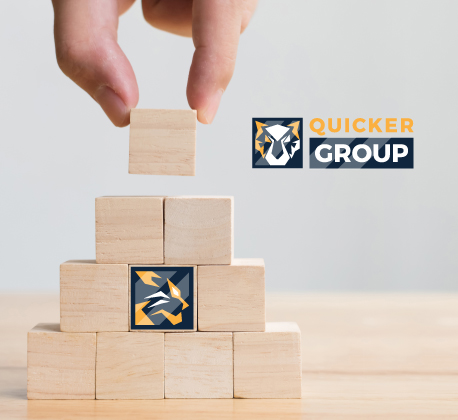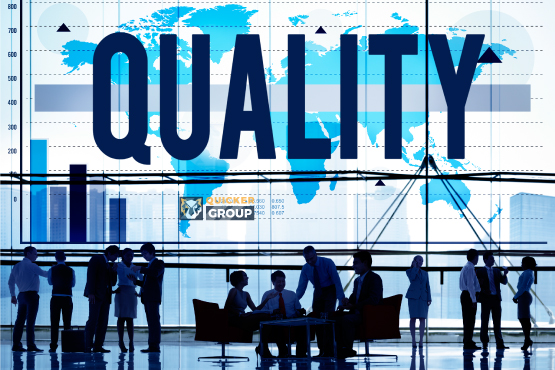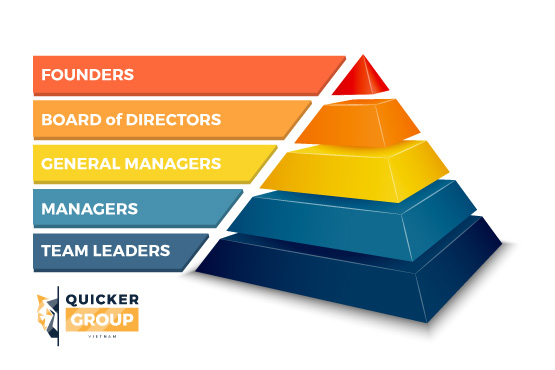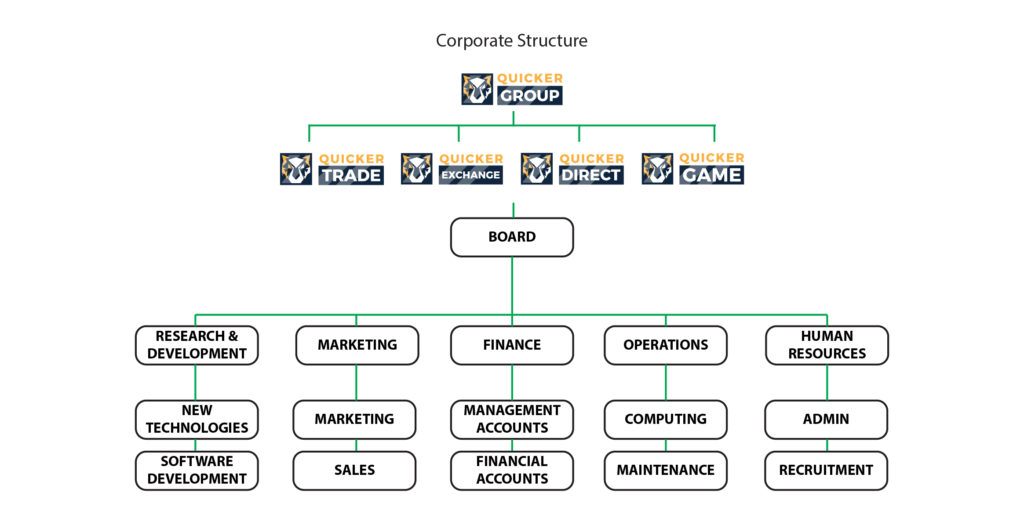
Forms of organisational structure
It is no easy task to design and develop a structure. Many organisations continuously debate whether to structure around products, geography, common tasks or information.
It is, however, possible to distinguish six important forms of organisational structure:
- functional structure
- product or service structure
- geographical structure
- matrix structure
- project team
- hybrid structure
Quickergroup will adopt a functional structure, with a view to control information between each department through senior department heads.
FUNCTIONAL STRUCTURE
A functional structure
The structure is appropriate when people within functional departments need to communicate regularly with each other. For example, in a marketing department, the marketing director will coordinate the activities of marketing specialists in fields such as promotion, advertising, product design, market research, and packaging. Although there is a need for communication with all the other parts of Quickergroup, the bulk of the information exchange and communication is likely to be within the functional areas, so it makes sense to group these people together.

Market leading
In response to a dynamic, fast changing and competitive environment, flexibility and speed of decision making have become increasingly important in modern organisations.
This has led to a number of trends in recent years:
The flattening of structures to remove levels in the organisational hierarchy. This shortens the chain of command and thereby increases the speed of decision making. The establishment of multi-functional project teams and an empowered, multi-skilled workforce to increase flexibility.
A customer service orientation rather than an inward, internal process orientation. The emergence of the ‘flexible firm’. In an increasingly competitive environment, continuous reduction of costs is essential.
Organisational departments and functions
Business organisations typically consist of a number of departments or functions and it is important to have an appreciation of the purpose and activities of these departments/functions in order to understand the role of management accounting in the organisation. After all, management accounting is concerned with providing managers at all levels with information to help them undertake their various activities and to monitor/report on the impact of these activities on the organisation. A well designed management accounting system must be based on an understanding of what various managers actually do.
Management accountants are increasingly acting as ‘business partners’ to teams in other functional areas of the organisation. If they are to be accepted within these decision making teams, it is essential they understand the operations and technology of the organisation.
Sections
Quickergroup limited will consist of the following main departments or functions:
- Research and Development (often abbreviated to R&D).
- Marketing (including the selling function).
- Finance.
- Operations.
- Human Resource Management.

Research and development
The Research and Development (R&D) department is concerned with developing Vietnam’s new and youngest talented individuals and companies, through Quickergame. It also includes new products or processes and improving existing products/processes through the use of computing, data management and business modelling systems. R&D activities must be closely coordinated with the organisation’s marketing activities to ensure that the organisation is providing exactly what its customers want in the most efficient, effective and economical way.
Marketing
Quickergroup marketing is concerned with identifying and satisfying customers needs at the right price. Marketing involves researching what customers want and analysing how Quickergroup companies can satisfy these wants. Marketing activities range from the ‘strategic’, concerned with the choice of product markets (and how to compete in them, for example, on price or product differentiation) to the operational, arranging sales promotions (e.g., offering free membership), producing literature such as product catalogues and brochures, placing advertisements in the appropriate media and so on. A fundamental activity of the Marketing Dept is managing the Marketing Mix consisting of Product, Price, Promotion and Place.
- Product. Having the right product in terms of benefits that customers value.
- Price. Setting the right price which is consistent with potential customers’ perception of the value offered by Quickergroup.
- Promotion. Promoting the product in a way which creates maximum customer awareness and persuades potential customers to make the decision to use our products and services.
- Place. Making our products and services available in the right place at the right time – including choosing appropriate distribution channels.
In order to be successful, a business enterprise must either have a lower price than its competitors (Alibaba, Lazada and Amazon etc..), or a product that is in some way superior – or both! A competitive strategy based on low price is known as a cost leadership strategy. A competitive strategy based on developing a superior product is known as a differentiation strategy.

Finance
The Finance department will play a vital role in monitoring company growth and is concerned with the following:
- Financial record keeping of transactions involving monetary inflows or outflows.
- Preparing financial statements (the income statement, balance sheet and cash flow statement) for reporting to the board and section directors. The financial statements are also the starting point for calculating any tax due on business profits.
- Payroll administration Paying wages and salaries and maintaining appropriate income tax.
- Preparing management accounting information and analysis to help section management to plan, control and make decisions.

Operations
Operations undertakes the activities necessary to provide the organisation’s products or services. Its main responsibilities are:
- planning, scheduling and deployment
- control and supervision of the companies workforce
- managing product and service quality (including process control and monitoring
- maintenance of office and equipment
- control of inventory that include stationery, staff uniforms, food and general supplies.
- deciding the best operational methods and logistics.
Close collaboration will usually be necessary between Operations and various other departments within the organisation, for example:
- Research and Development, concerning the implications of software, product and/or service design for all methods of use, including sustainability and cost
- Marketing, concerning desired functionality, appearance, quality and so on
- Finance, concerning the availability of funds for purchase of new equipment and the acceptability of inventory levels.
- Human Resource Management, concerning staff motivation implications of job design and creation methods.
Human Resources
Human Resources role is concerned with the following:
- Recruitment and selection. Ensuring that the right people are recruited to the right jobs within Quickergroup.
- Training and development. Enabling employees to carry out their responsibilities effectively and make use of their potential.
- Employee relations. Including negotiations over pay and conditions.
- Grievance procedures and disciplinary matters. Dealing with complaints from employees or from the employer.
- Health and Safety matters Making sure employees work in a healthy and safe environment.
- Redundancy procedures Administering a proper system that is seen to be fair to all concerned.
Organisations like Quickergroup are dependent on employees. Consequently, their recruitment and selection require careful management.
In recent years, the Human Resources function has attained a more important status as there has developed an increasing need (especially in service organisations) to ‘get the most’ from employees, in terms of customer service, for the benefit of the organisation.

BONUSES
Performance related
A generous package for all management is awarded at Quickergroup. This package is subjected to performance related targets, goals and achievements, for which the founding members of Quickergroup will choose to either award or carry over into the next fiscal year depending on performance. A simple system where by 1% (one percent) of NET profit is paid to each tier (combined total of 5%). This incentive is written into our mandate and will continue to provide an incentive platform for all levels of management acting for the company, which creates corporate loyalty at all management levels.




